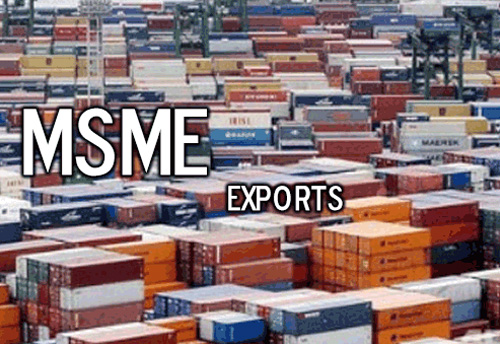
Steps taken by Govt of India for the MSMEs Exporters
NEW DELHI : The Government has taken a number of steps to facilitate easy access to credit for the MSME sector in the country, through various schemes, programmes and policy initiatives. Some of the schemes implemented are as follows.
To facilitate the flow of credit to the Micro and Small Enterprises, without the hassles of collateral and third party guarantee up to a maximum of Rs. 5 crore, Credit Guarantee Scheme for Micro and Small Enterprises has been implemented.
Prime Minister Employment Generation Programme (PMEGP) is a major credit-linked subsidy program, aimed at generating self-employment for Micro Enterprises.
Pradhan Mantri Mudra Yojana (PMMY) extends collateral free credit up to Rs.10 lakh.Stand-Up India (SUI) Scheme facilitates loans from Scheduled Commercial Banks (SCBs) of value between Rs. 10 lakh and Rs. 1 crore to at least one Scheduled Caste (SC) or Scheduled Tribe (ST) borrower and one women borrower per bank branch.
PM Vishwakarma Scheme envisages to provide end-to-end holistic support, including credit support to artisans and craftspeople in the 18 trades covered.
Launch of Udyam Assist Platform on 11.01.2023 to bring Informal Micro Enterprises (IMEs) under the formal ambit of MSME.
Inclusion of Retail and Wholesale traders as MSMEs for the purpose of availing Priority Sector Lending benefits, w.e.f. 02.07. 2021.
Ministry of MSME implements the International Cooperation (IC) Scheme. Under this Scheme, financial assistance is provided on reimbursement basis to the eligible Central / State Government organizations and Industry Associations to facilitate the participation of MSMEs in international exhibitions, fairs and buyer-seller meets held abroad. Further, organizing international conference, seminar and workshops in India are also included in the scheme. Additionally under the new component of IC Scheme, namely Capacity Building of First Time Exporters (CBFTE) launched in June 2022, reimbursement is provided to new Micro & Small Enterprises (MSEs) Exporters for costs incurred on Registration-cum-Membership Certification (RCMC), Export Insurance Premium and Testing & Quality certification for exports. These interventions under IC Scheme assist the exporters in the MSME sector to increase their access to international markets. Ministry of MSME has established 60 Export Facilitation Centers (EFCs) across the country with an aim to provide requisite mentoring and handholding to MSEs.
The Government has taken measures to promote exports from the districts under the District as Export Hub Initiative. Products/Services with export potential have been identified in the districts. An institutional mechanism has been set up in all States/UTs by forming the State Export Promotion Committee (SEPC) and District Export Promotion Committee (DEPC) at the District level. Under the initiative, District Export Action Plans detailing the existing bottlenecks in the supply chain and identifying possible interventions to mitigate the existing gaps are being prepared for all the districts. To encourage exports from the districts under “Districts as Export Hubs”, DGFT through Regional Authorities has been engaging with States & Districts to conduct export promotion outreach events. This includes handholding sessions with exporters and export related awareness sessions.
The Government has taken a number of steps to facilitate the loans for the Micro, Small and Medium Enterprises and ease the procedure involved in getting the loans. Some of these steps are as follows:
- Credit Guarantee Scheme for Micro and Small Enterprises, for which Credit Guarantee Fund Trust for Micro and Small Enterprises provides guarantee to its Member Lending Institutions (MLIs), for the credit extended by them to Micro and Small Enterprises.
- Prime Minister’s Employment Generation Programme (PMEGP), which is a major credit-linked subsidy programme.
- Launch of Udyam Assist Platform (UAP) to bring the Informal Micro Enterprises (IMEs) under the formal ambit for availing the benefit under Priority Sector Lending.
- PM Vishwakarma Scheme provides credit support to artisans and crafts people in the 18 trades covered.
- Pradhan Mantri Mudra Yojana (PMMY) for loans up to Rs. 10 lakh.
- Stand-Up India (SUI) Scheme to facilitates loans from Scheduled Commercial Banks (SCBs) of value between Rs. 10 lakh and Rs. 1 crore, to at least one Scheduled Caste (SC) or Scheduled Tribe (ST) borrower and one Women borrower per bank branch.
To ease the procedures involved in getting loan, Digital Public Infrastructure (DPI) is used. This is a technology system that promotes interoperability, openness and inclusion to deliver vital public and private services, including access to credit. Udyamimitra Portal and Psbloanin 59 minutes provide ease of access to credit for MSMEs.
Trade Receivables Discounting System (TReDS) is a platform for financing/discounting of trade receivables of Micro, Small and Medium Enterprises. On these platforms, the financing of Factoring Units (FUs) helps in improving the access to finance by MSMEs. As informed by SIDBI, as on May, 2024, four digital platforms have been authorized to carry TReDS operations in the country. There are more than 5,000 buyers and over 53 Banks/13 NBFC registered as financers.
This information was given by the Minister of State for Micro, Small and Medium Enterprises, Sushri Shobha Karandlaje in a written reply in the Lok Sabha.

